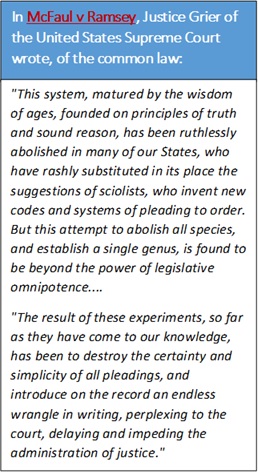Related articles and updates:
- The FDA stole our stuff
- Antitrust Violations
- FBI Corruption
- FDA gets caught and admits guilt press release
- FDA gets caught and admits guilt interview (video)
- FDA full affidavit
- FBI report with full details
- Notice is served on Battelle Memorial Labs
- Notice is served on the Grocery Manufacturers Association
- Information Memorandum, warning to the Food Industry
- A king and his indiscretion
- The FDA has gone Native
The Food and Drug Administration has gone native
By John Hnatio
The technical term for what’s going on at the FDA is called “regulatory capture.” Regulatory capture is when powerful industry interests take over control of the very agencies that are supposed to be regulating them. In the government, we use the more colloquial term “gone native” to describe the phenomenon.
In researching this piece, I came across a great article written by William Sanjour appearing in Independent Science News entitled, Designed to Fail: Why Regulatory Agencies Don’t Work. A wonderful read that describes the multidimensional factors at play within federal regulatory agencies that more often than not leads to their own failure.
Like Sanjour, I am a 30 year retiree of the Federal service who worked at the Department of Energy (DOE). At DOE, my responsibilities involved the protection of nuclear weapons, special nuclear materials and the classified know-how required to build nuclear bombs.
 In the 1980’s I saw firsthand exactly what William Sanjour describes in his article- a federal agency “gone native” with the very same industry contractors they were supposed to be regulating. In this case, it was the National Nuclear Security Administration’s (a component of DOE) nuclear weapons laboratories and production plants that were under the control of industry contractors.
In the 1980’s I saw firsthand exactly what William Sanjour describes in his article- a federal agency “gone native” with the very same industry contractors they were supposed to be regulating. In this case, it was the National Nuclear Security Administration’s (a component of DOE) nuclear weapons laboratories and production plants that were under the control of industry contractors.
One day I was sitting in my government office when I was asked to concur on a memorandum to President Reagan telling him that everything was just hunky dory with DOE’s ability to protect nuclear weapons, and the special nuclear materials needed to build them from the threat of nuclear terrorism. Well, the only problem is that I had just come off a series of highly classified security and safety assessments of nuclear weapons facilities that showed that DOE was trying to tell the President a huge lie. When I refused to concur on the memorandum to President Reagan all hell broke loose.
For the next five years I was sidelined. When I was reassigned to the DOE mailroom I came across a “kill file” showing how my DOE bosses planned to fire me. The General Accounting Office conducted an investigation that blew the lid off of the situation. John Dingell, the powerful Chairman of the Energy and Commerce Subcommittee on Oversight and Investigations stepped in and held a hearing on the situation. It was a classic case of the regulatory capture described so well by William Sanjour.
But just when I thought I had seen it all I came across the FDA. I thought DOE was bad but now I was about to see the really ugly. After I left DOE, I decided to go back to school and get my doctorate degree. My research interest was in the area of scientifically projecting the future using computer analytics. In 2003, I applied for and eventually received a patent on what is now known as predictive analytics. Then I decided to apply my new invention to improve the food supply.
Like so many other little guys trying to start up a high tech small  business, I mistakenly thought that my idea was so good, and after all I owned a patent for heaven’s sake, that the FDA would have to work with me whether they liked it or not. This is where I began to make a series of mistakes that cost me dearly. My first step, as an eager neophyte, was to submit to FDA a proprietary unsolicited proposal describing my patented invention and trade secrets. At the time, I was still idealistic and naive enough to believe that everybody was in favor of making the food we all eat safer. Right?
business, I mistakenly thought that my idea was so good, and after all I owned a patent for heaven’s sake, that the FDA would have to work with me whether they liked it or not. This is where I began to make a series of mistakes that cost me dearly. My first step, as an eager neophyte, was to submit to FDA a proprietary unsolicited proposal describing my patented invention and trade secrets. At the time, I was still idealistic and naive enough to believe that everybody was in favor of making the food we all eat safer. Right?
Wrong! What happened was that the FDA simply took my intellectual property, duplicated my predictive analytic tools, and forced my little company out of business. My first reaction was to become angry and terribly frustrated. “How can this possibly be happening to me?” I asked myself. I became a classic baited bull. I turned to Senator Mikulski and Representative John Delaney of my congressional delegation. All they did was tell me, “We don’t get involved with legal matters.” I wrote letter after letter to Kathleen Sibelius, the Secretary of Health and Human Services (HHS). She simply ignored me. The lawyers at FDA and HHS covered the situation up. They knew full well that small businesses can’t afford to sue the government. Needless to say, I went from angry to even angrier.
Still in my baited bull stage, I sat down and wrote the most detailed report of its kind ever written on the corruption of the FDA as they systematically drove my company out of business. I identified all of the laws and regulations that were violated and provided the documentation to prove it. I took the report to the Inspector General at HHS, the Federal Bureau of Investigation (FBI); the U.S. Attorney; the Antitrust Division of the Department of Justice; the General Accounting Office (GAO). They all did absolutely nothing.
At the very height of my baited bull stage I said to myself, “I’m not going to take this stuff anymore!” and I began to tell everyone who would listen that the U.S. Government didn’t give a hoot about things like the Constitution of the United States and the whole notion of justice. I told everyone that the FDA was the most corrupt agency in the government. But people just shrugged their shoulders saying, “So what? There’s nothing you can do about it. The government’s too big to fight.”
At this point I sat down and said to myself, “Golly gee willickers, the entire system is broken.” That’s when I realized that any strategy to clean up the corruption in our government would require an American public that was knowledgeable and motivated to go back to the principles of the American Constitution- a public that was willing to demand better from their own government. This is when I began to make the transition to the “elder statesman” stage.
 As I considered my next steps, I read a book entitled, The Law written by Frederic Bastiat written shortly after the French Revolution. After reading the book I realized that the bigger system of justice itself was perverted because it denies the common man equal access to the very laws that were designed to protect his fundamental rights. The message is simple and clear. If you are not among the wealthy you cannot afford to defend your rights.
As I considered my next steps, I read a book entitled, The Law written by Frederic Bastiat written shortly after the French Revolution. After reading the book I realized that the bigger system of justice itself was perverted because it denies the common man equal access to the very laws that were designed to protect his fundamental rights. The message is simple and clear. If you are not among the wealthy you cannot afford to defend your rights.
In my case I couldn’t even think about the possibility of hiring an attorney to take on a case that would likely go on for ten years or more at a cost of millions and millions of dollars. The investors in my company were “angels” who had no stomach for risking more of their hard-earned money on a protracted lawsuit. Instead, they decided to just write off their losses. No attorneys were willing to even consider taking a lawsuit against the government on a contingency basis. And, if you are thinking that you can be your own attorney to save money, think again. An officer of a business that has shareholders cannot even defend himself in a court of law. So the reality is simply this- the very legal system that is supposed to provide justice for all is, in fact, perverted to protect the government even when it trounces upon the rights of the common man in defiance of the Constitutional principles upon which our country is founded.
Of course, the implications of all of this on small start-up high tech businesses are huge. As a small business that is legitimately trying to protect your intellectual property by pursuing a lawsuit, forget it. In the future, it’s likely that your lawsuit will be thrown out of court as frivolous. This is because congress, in league with big corporations, is now moving forward to pass new “patent troll” legislation that will make it even easier for the government and their large industry contractors to steal intellectual property from small businesses. The amount of lobbying money being spent by big business in pursuit of new patent laws is astounding.
So, how can you play any sort of game on such an uneven playing field? We decided on a three pronged strategy. First, we knew that we needed to make the American people more aware of the things that their own government is doing. The fundamental proposition here is that most people are good and once they understand what’s happening they will insist that the right things be done.
 Second, to get the word out you must be your own mouthpiece. To put it mildly, the mainstream media is asleep at the wheel. Edward R. Murrow, the wonderful investigative news reporter of Senator McCarthy fame is surely turning over in his grave at the failure of the national media to do their job of investigating and objectively reporting the real news. The simple fact is that we cannot maintain a democracy without the accountability that the free press is supposed to provide. Today, the biggest danger to our freedom is the failure of the main stream media to live up to its responsibility to objectively and honestly report the news wherever and whenever events are newsworthy.
Second, to get the word out you must be your own mouthpiece. To put it mildly, the mainstream media is asleep at the wheel. Edward R. Murrow, the wonderful investigative news reporter of Senator McCarthy fame is surely turning over in his grave at the failure of the national media to do their job of investigating and objectively reporting the real news. The simple fact is that we cannot maintain a democracy without the accountability that the free press is supposed to provide. Today, the biggest danger to our freedom is the failure of the main stream media to live up to its responsibility to objectively and honestly report the news wherever and whenever events are newsworthy.
Third, we must find a way to make access to the justice system available to everyone. Whether you are rich or poor can no longer be the determinant of whether your basic rights are protected or not. The way things are going Bastiat is right when he cautions that the law itself becomes perverted when we deny equal access to the promise of justice for everyone.
To implement our strategy we established the John Galt Program for Investigative Studies (JGPIS) earlier this year as one of two major divisions of the Institute for Complexity Management (ICM). ICM is a non-profit charitable organization that addresses intractable social issues. JGPIS provides small businesses and others who have had their Constitutional rights violated with pro bono assistance in conducting investigations that are used to help hold the government accountable for its actions. We use the JGPIS website and blog as our mouthpiece to provide the American public with the highest quality investigative analysis and reporting possible. Our third goal at JGPIS is to work within the existing system to find new ways to apply the law that will make our system of justice accessible to all Americans.
 One of our most exciting projects at JGPIS involves innovative applications of common law to reduce costs and make the justice system more accessible to people from all walks of life. Common law constitutes the principles and rules of action applicable to the government and the protection of persons and property that derive their authority from the community customs and traditions that evolved over the centuries as interpreted by judicial tribunals. Common law is embodied in case law rather than legislative enactments. Under common law, all citizens, including the highest-ranking officials of the government, are subject to the same set of laws, and the exercise of government power is limited by those laws.
One of our most exciting projects at JGPIS involves innovative applications of common law to reduce costs and make the justice system more accessible to people from all walks of life. Common law constitutes the principles and rules of action applicable to the government and the protection of persons and property that derive their authority from the community customs and traditions that evolved over the centuries as interpreted by judicial tribunals. Common law is embodied in case law rather than legislative enactments. Under common law, all citizens, including the highest-ranking officials of the government, are subject to the same set of laws, and the exercise of government power is limited by those laws.
We have three major ongoing investigations that are exploring innovative applications of common law. The first case involves my company Projectioneering LLC and the theft of our intellectual property by the FDA from one of my companies FoodQuestTQ LLC. In this case we are using the Uniform Commercial Code (UCC). The UCC is a set of laws that provide legal rules and regulations governing commercial or business dealings and transactions.
Using this approach, we issued what is called a “constructive notice” to the FDA. A constructive notice is a sworn affidavit of truth setting forth the facts of a case with supporting evidence. In this case, the Acting Commissioner of the FDA, Dr. Stephen Ostroff, was given 45 days to rebut the facts of the theft as presented to him by Projectioneering LLC but he chose not to do so. Under the law, the facts as presented to Dr. Ostroff and the FDA by Projectioneering LLC automatically become conclusive facts in courts of law because they failed to rebut the affidavit. And it is not only just the FDA. FDA contractors who were involved in the theft, industry and trade associations, and individual food companies who continued to use the stolen Projectioneering LLC intellectual property even though they were warned not to do so now find themselves at serious risk too. FDA’s admission of guilt in the case of Projectioneering LLC has far reaching implications that can serve as a “game changer” for small businesses who are the victims of government corruption and the theft of their intellectual property.
Our second case involves a little company called Demodulation. Several years ago Demodulation developed a patent portfolio around something called microwire. Microwire is as thin as a human hair and can be concealed in just about any product you can think of. The interesting thing about microwire is that it can be easily detected at both short and long distances even by satellites in space. You can just imagine the uses of microwire for tracking products. But microwire also has very important national security uses. In the case of Demodulation, rather than lawfully licensing the technology, the U.S. Government engaged in an intelligence gathering program to steal the company’s trade secrets and then clandestinely develop the technology under classified programs in collusion with their major defense and intelligence contractors. We are now exploring the applications of common law to help Demodulation in their fight against the U.S. Government in this landmark case.
Our third ongoing case involves a small business called Wesleyan Company. Several years ago, the small company developed a new drinking system for soldiers on the battlefield that protects them from the effects of chemical and biological warfare. When the small company presented their patented invention to the U.S. Army they simply stole the technology. But what is so egregious about this case is that U.S. Army officials purposely delayed the production of the new technology. They did this so that the profits for producing the new drinking system could be directed to their own U.S. Army group of “preferred” contractors. The result was that the U.S. Army itself left the lives of our soldiers at unnecessary risk during wartime because of their own greed. Our investigation has revealed new evidence of judicial and U.S. Army counsel misconduct in the case and we are about to issue an affidavit of truth to the Secretary of the Army, John M. McHugh, presenting the facts of the case.
If you are a small company that is the victim of theft of your intellectual property and cannot afford the costs of expensive and protracted litigation against the U.S. Government and their contractors that engage in the theft of intellectual property, we encourage you to contact us. We are a non-profit organization that is here to help you.
Finally, providing no-cost assistance to the victims of government corruption requires resources. If you have not done so already, we ask for your tax-deductible contributions. All of the donations we receive at JGPIS go directly to the support the victims of fraud, waste, and abuse, by the U.S. Government. Thank-you in advance for supporting JGPIS and the Constitution of the United States of America.
